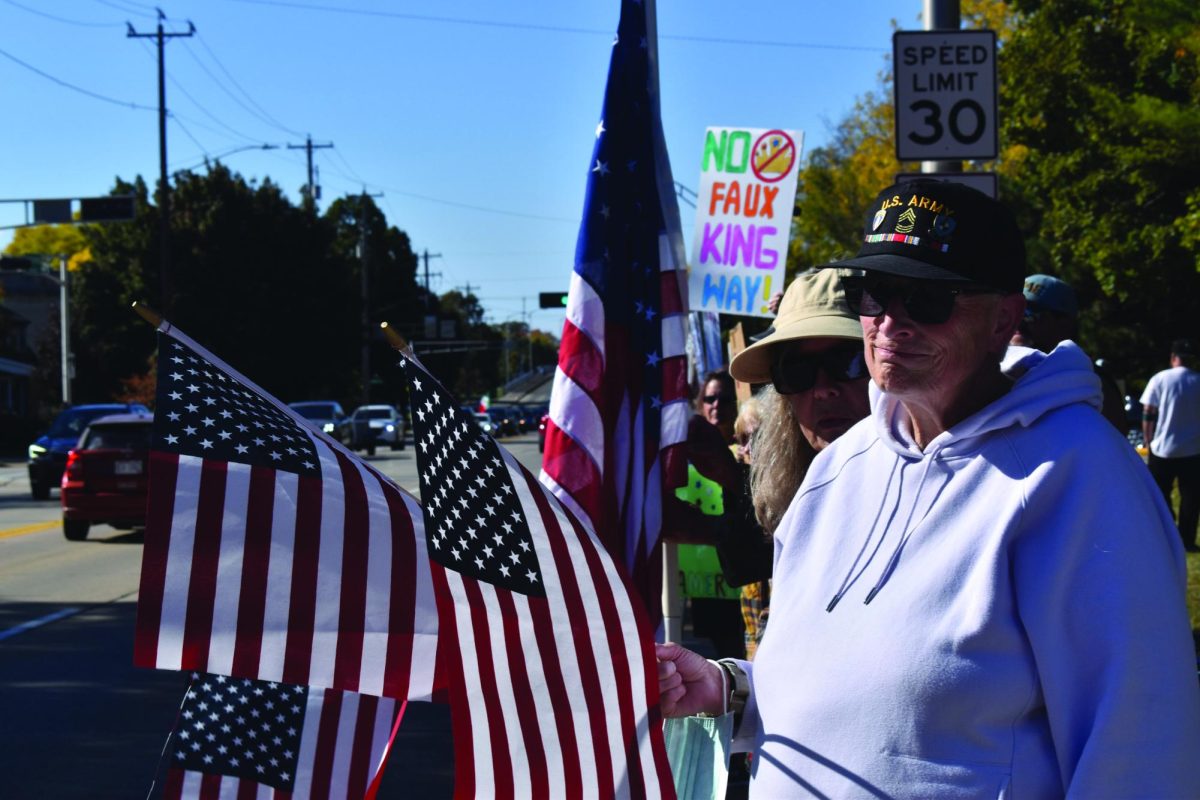In November 2013, UW Oshkosh defensive lineman Dexter Charles took the field to play what would come to be the last game of his collegiate career.
The 6-foot-7-inch, 265-pound sophomore ended the day with five tackles and a sack adding to his already impressive stats.
Charles only played football at UWO for one year, but his 2013 sophomore season as a defensive lineman was quite productive. He had the second most sacks on the team and totaled 25 tackles in the 10 games he played.
Just a year before, Charles was racking up criminal charges instead of defensive statistics. During a four-month period in 2012, Charles was cited 17 times by police according to Wisconsin Circuit Court Access. His offenses ranged from minor traffic violations to felony drug charges.
Six months after his last game, Charles was arrested when police found a 22-year old Oshkosh woman dead in her home from a heroin overdose.
In August 2014, Charles was charged with first-degree reckless homicide.
According to police, Charles sold heroin to Oshkosh resident Deanna Lake, who then overdosed on the drug and died in her home.
According to Wisconsin Circuit Court Access, prior to his admittance to the team, Charles already had a long list of criminal offenses that included selling marijuana, resisting arrest and operating a vehicle while intoxicated.
UWO football coach Pat Cerroni declined to comment on why someone with a record like Charles would be allowed to play.
UWO Athletic Director Darryl Sims simply said such decisions are determined on a “case-by-case basis” and Charles was given specific criteria to adhere to.
Dexter’s brother, Darrin Charles, also played football in Oshkosh. Although Darrin didn’t play for UWO, he was a standout receiver at Oshkosh North High School, where he helped lead the team to a state championship.
Darrin went on to play for the Wisconsin Badgers and even signed with the Chicago Bears for a short span in 2005. He declined to comment on his brother’s ongoing case.
On May 30, 2014, the Oshkosh Police Department received a call from Deanna’s mother, Lisa Lake, saying her daughter had locked herself in her room and would not respond. She gave permission for the responding officers to kick in the door to see if Deanna was all right.
When officers reached Deanna, she was already deceased, lying face down in her bed. Upon searching the room, detectives found a purse on the floor that contained a needle, a spoon and a substance later confirmed to be heroin.
Dexter Charles became a suspect after Lake’s sister, Amber, identified him as one of Lake’s potential drug dealers. Lake’s boyfriend at the time, Michael Rueger, also admitted to buying heroin from Charles in the past.
Amber Lake said that her family was surprised by her sister’s heroin use and devastated by her untimely death.
“My sister was everyone’s best friend,” Lake said. “She was passionate and full of life.
According to Amber, her sister wasn’t the type of person to belong to one specific crowd because she got along with everyone.
Amber said her family has attended every one of Charles’ hearings and plans to continue doing so. She said because of the intense suffering her family has endured, she will likely never forgive Charles for his actions.
“He needs to hear from the people he hurt second most,” Amber said. “We are the voice for my sister now, and we are going to be heard.”
Heroin has recently become a substantial problem in the Oshkosh area. It was so much so that in 2013, community leaders developed a specific task force in response to the spike in heroin deaths.
The heroin task force is a part of a larger Reth!nk campaign that aims to improve the health and safety of Winnebago County communities.
The task force employs four different pillars: prevention, harm reduction, treatment and law enforcement.
Reth!nk coalition coordinator Heidi Keating said the pillars divide responsibility among various groups and individuals to better address the complex issue of heroin addiction.
For example, Keating said a 5k run coordinated by the prevention pillar last fall raised nearly $15,000 to increase addiction awareness in the community.
“Awareness is really important when it comes to an issue like this,” Keating said. “There’s a stigma that comes with heroin addiction, which can make it even harder for addicts to find help.”
Keating also said heroin is one of the easiest drugs for people to get addicted to, as well as one of the hardest to quit.
“We often find that people with heroin addictions don’t initially seek the drug out,” Keating said. “Many people get unintentionally addicted to opiates after taking drugs like hydrocodone and oxycontin for pain or injuries.”
Keating said after their prescription runs out, many are left with a crippling addiction and little knowledge of what to do next. Even if they can find pills illegally, many turn to heroin for a cheaper and more readily available solution.
Amber said she is grateful for the efforts of the task force, because she was personally unaware of the heroin problem in Oshkosh before her sister’s death and thinks others might be as well.
“I learn everything I can about it so I can be aware myself and help educate others,” Amber said. “I think the Heroin Task Force is doing a good job.”
Amber said she would like the Oshkosh community to get more involved.
Those interested in volunteering for Reth!nk are encouraged to join the various committees and work groups listed on the program’s website or visit the Winnebago County Health Department located at 112 Otter Ave.








